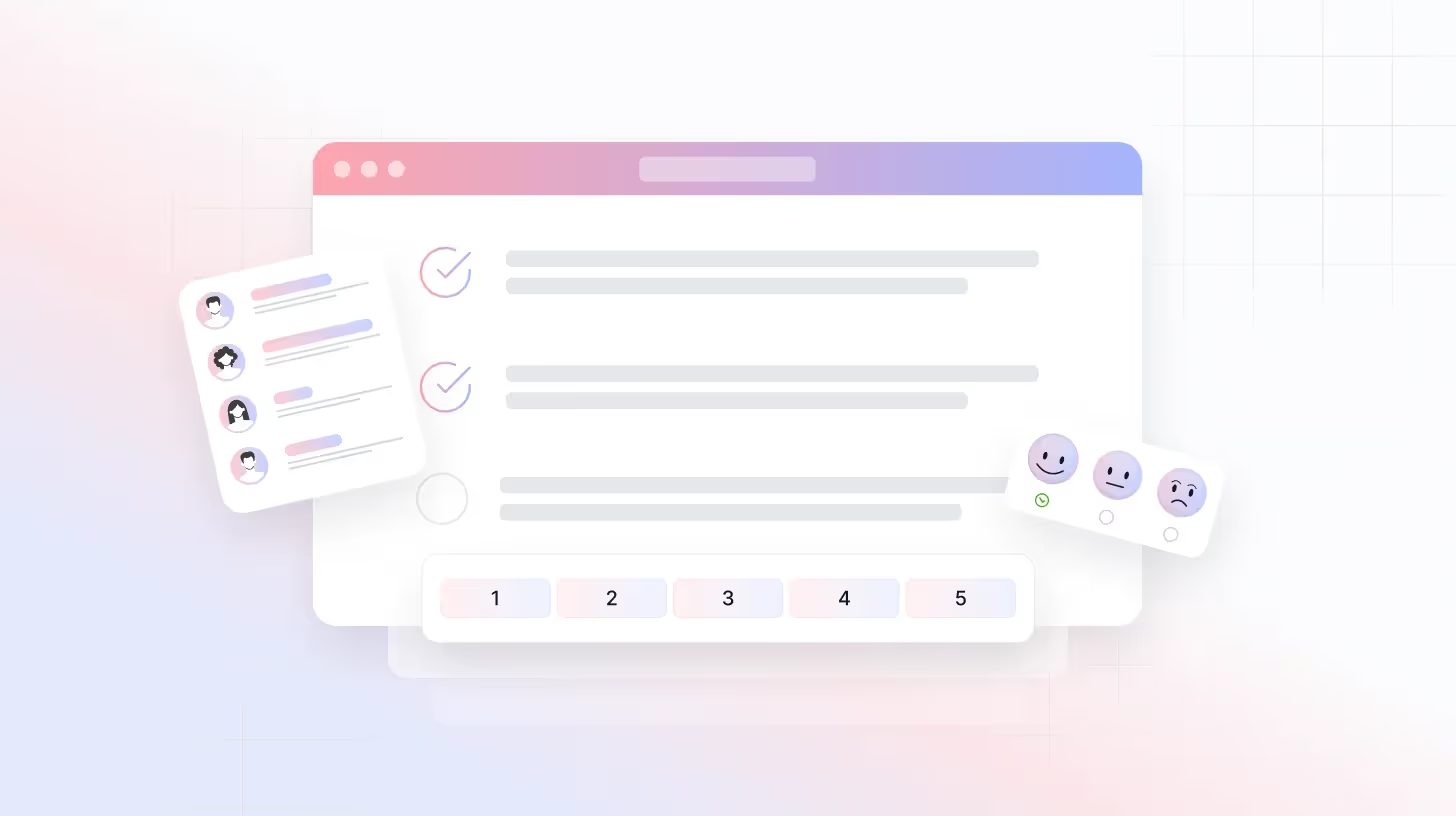50+ Healthcare Survey Questions to Improve Patient Care

Providing excellent care isn’t just about treatments and technology; it's about listening. That’s where healthcare surveys come in. They go beyond diagnosing illness to diagnosing experience, capturing patient voices, staff sentiments, and system-wide gaps. In fact, a 2024 report by HealthTech Insights found that hospitals using real-time patient feedback saw a 19% increase in care efficiency and satisfaction.
Take the example of the Cleveland Clinic, which revamped its internal and patient-facing surveys to better understand what mattered most to patients and staff. As a result, they improved communication protocols, reduced appointment delays, and boosted overall trust in their care delivery model.
The takeaway? You can’t improve what you don’t measure, and that starts with asking the right questions. Clear, thoughtful, and well-timed questions can reveal powerful insights about patient experience, provider performance, and workplace health.
In this article, you’ll find 50+ essential healthcare survey questions, grouped by topic from mental health to wait times, staff feedback to billing. Each category also includes a quick explanation of why these questions matter, so you can collect smarter feedback and take action where it counts.
Let’s get into it.
What Type of Healthcare Service Did You Use?
Here are the most common types of healthcare services patients interact with. Understanding which one you used helps us tailor feedback and improve specific areas of care.
5 Must-Know Tips to Avoid Healthcare Survey Pitfalls
Avoiding common survey mistakes can mean the difference between rich insights and a report no one trusts. Skipping the planning phase leads to vague or biased questions, which drag down your response rate and leave decision-makers flying blind. A little prep goes a long way.
1. Keep it Short — Seriously
One major pitfall? Making surveys too long. According to Research Methods in Healthcare Epidemiology, long questionnaires can slash response rates by up to 30%. Patients and staff alike will abandon halfway if the questions feel endless.
Tip: Cut nonessential items. Group related questions by theme. Want a shortcut? Need a shortcut? Use TheySaid to instantly build a focused Healthcare Feedback Survey.
2. Watch Your Wording
Wording shapes the answers. For example, asking “Did you receive timely care?” assumes a binary and may lead to overreporting. Instead, ask “How would you rate the timeliness of care?”
Studies on questionnaire design show that vague or leading wording distorts feedback, and multiple-choice scales must be clear and intuitive to avoid confusion.
3. Think Mobile-First
Neglecting mobile usability is another silent killer. If a patient opens your survey and has to pinch-zoom or swipe endlessly, you’ve already lost them.
Make sure your survey:
- Loads quickly on phones and tablets
- Uses clear, tappable buttons
- Has a clean vertical flow
Test it across devices before launch.
4. Include a Mix of Scales and Open-Ends
Too many Likert scales in a row? People check out. Use a healthy mix of ratings for quantifiable aspects and open-ended questions to capture emotional or qualitative insights.
Patients often reveal more in their own words. Just one open-text box at the end can unlock gold.
5. Tie Each Question to a Decision
Before launching, ask: “What would we do if 60% of people answer this negatively?” If there’s no clear action tied to a question, it might not belong.
Top 10 Use Cases of Healthcare Surveys (2025)
Here are 10 practical use cases for healthcare surveys in 2025:
1. Boosting Patient Satisfaction
One of the most common uses of healthcare surveys is to assess patient satisfaction. From check-in to discharge, surveys reveal how patients feel about wait times, staff behavior, cleanliness, and the overall quality of care.
2. Improving Doctor-Patient Communication
Good communication saves lives. Surveys can help you evaluate how well doctors explain diagnoses, involve patients in treatment decisions, and make them feel heard.
3. Streamlining Appointments and Wait Times
Use healthcare feedback surveys to identify common complaints about long wait times or confusing appointment scheduling. Then, use that data to simplify and improve patient flow.
4. Tracking Mental Health and Well-being
Mental health screening surveys can catch early signs of anxiety, depression, or burnout—whether among patients or healthcare employees. A few simple questions can spark timely support.
5. Supporting Healthcare Employee Engagement
Nurses, doctors, and support staff need to feel valued, too. Internal healthcare employee surveys can uncover burnout risks, training needs, or morale issues before they impact care quality.
6. Evaluating Treatment Outcomes
Healthcare satisfaction surveys can go beyond service and track how well patients respond to treatments. This helps providers fine-tune care plans and improve clinical effectiveness.
7. Improving Health Literacy and Patient Education
Patients often leave confused about medications, aftercare, or follow-up steps. Surveys can highlight where more patient education is needed and how to deliver it effectively.
8. Ensuring Cleanliness and Safety
Ask patients how clean they found the facilities, whether safety protocols were followed, or if they felt secure during their visit. Hygiene-focused surveys are especially critical post-COVID.
9. Gathering Feedback on Billing and Insurance
Healthcare billing can be a major pain point. Use surveys to find out if patients understand their bills, feel fairly charged, and know what their insurance covers.
10. Measuring Accessibility and Inclusion
Make sure your healthcare services are welcoming and accessible to everyone. Surveys can uncover whether language barriers, physical access issues, or cultural mismatches are affecting care delivery.

50+ Best Healthcare Survey Questions You Should Ask
Below are 50+ carefully selected healthcare survey questions to help you gather valuable insights across patient care, service delivery, and organizational performance.
Patient Experience Questions
These questions offer a 360° view of how patients feel throughout their care journey. From first impression to follow-up, every step matters.
- How easy was it to book your appointment?
Booking friction often causes early drop-offs or no-shows. This reveals issues with digital tools or front-desk efficiency.
- How would you rate your check-in experience?
Long wait lines or confusing signage make people feel anxious or ignored. This helps identify process gaps.
- Did the care team listen and respond to your concerns?
Being heard is the #1 driver of patient satisfaction. Low ratings here may indicate rushed or impersonal care.
- Were you informed about what to expect during your visit?
Setting expectations reduces fear and builds confidence. This question reveals gaps in pre-visit communication.
- How satisfied are you with your overall experience?
A simple benchmark that ties all touchpoints together. Useful for tracking performance over time.
Provider Communication Questions
Clarity, tone, and empathy shape how patients absorb information. These questions reveal how well your providers connect.
- Did your provider explain your condition in a way you understood?
Medical jargon often confuses patients. This measures the clarity and accessibility of explanations.
- How comfortable did you feel asking questions during the visit?
When patients hesitate to speak up, critical info gets missed. This flags communication breakdowns.
- Did the provider check to ensure you understood the next steps?
A simple check-in at the end prevents misunderstandings. It’s key to treatment compliance.
- Was the tone of communication respectful and reassuring?
Even accurate info feels cold if the tone is harsh. This gauges emotional intelligence.
- Did your provider seem to know your medical history?
Patients expect personalized care. This question identifies gaps in record access or prep.
Doctor Interaction Questions
This category explores how patients feel during face-to-face interactions with their doctor, the cornerstone of trust-building.
- How would you rate your doctor’s bedside manner?
Tone, empathy, and attention matter more than titles. Poor bedside manner breaks trust quickly.
- Did your doctor spend enough time with you?
Rushed appointments often leave key issues unexplored. This helps balance scheduling with quality care.
- Did your doctor involve you in decision-making?
Shared decision-making improves satisfaction and outcomes. This measures autonomy and inclusion.
- Did the doctor review your medication list and history thoroughly?
Medication mismanagement is a common safety risk. This signals attention to detail.
- Would you want to see this doctor again?
A powerful loyalty signal. Low scores can reveal deeper issues in approach or compatibility.
Healthcare Policy Feedback Questions
Your policies shape patient trust. These questions uncover how transparent and patient-centered your system feels.
- Were your rights and responsibilities as a patient explained?
Lack of awareness can lead to confusion or disputes. This ensures informed consent and fairness.
- Do you feel confident that your data is protected and private?
Privacy is foundational to trust. This gauges perceptions around data handling and security.
- Were your preferences (e.g., language, gender of provider) accommodated?
Personalization matters. This highlights whether patient rights translate into action.
- Did you understand the facility’s billing and insurance policies?
Vague policies frustrate patients post-visit. This ensures clarity in admin communication.
- Would you like to be more involved in care planning decisions?
Patients want a say in their care. This encourages more participatory healthcare models.
Hospital Facility Feedback Questions
Physical space affects how patients feel and heal. These questions help you assess your environment’s impact.
- How clean and hygienic was the facility during your visit?
Cleanliness affects perceptions of safety and professionalism — especially post-COVID.
- Was the waiting area comfortable and welcoming?
Comfort can reduce stress and improve the care experience. This highlights overlooked pain points.
- Did you feel safe navigating the space (e.g., elevators, signs, lighting)?
A confusing layout or poor lighting affects patient confidence. Safety starts with design.
- Were accessible facilities (e.g., ramps, restrooms) available and functional?
Patients with disabilities face unique challenges. This helps flag inclusion gaps.
- Was there enough privacy during check-in, examination, or discussions?
Lack of privacy can make patients hold back. This measures respect and dignity.
Mental Health Assessment Questions
Mental health is essential to holistic care. These questions help detect emotional well-being issues that often go unspoken.
- In the past two weeks, how often have you felt anxious or overwhelmed?
Regular anxiety can interfere with recovery. This flag needs of further mental health support.
- Have you had trouble sleeping, concentrating, or finding motivation lately?
These are early signs of burnout or depression. Spotting them early enables intervention.
- Do you feel emotionally supported by your care team?
Emotional care is just as vital as physical treatment. This reflects your team’s empathy.
- Were you asked about your mental health during your visit?
Many providers still skip this step. Asking shows mental health is treated seriously.
- Would you be open to talking to a mental health professional?
This encourages reflection and makes follow-up easier. It can lead to life-changing support.
Wait Times & Appointment Scheduling
Delays and inefficiencies break trust fast. These questions reveal if patients feel their time is respected.
- How long did you wait past your appointment time?
Wait times directly impact satisfaction. Long waits can erode trust instantly.
- Were you informed about any delays or changes ahead of time?
Proactive communication softens frustration. Patients appreciate transparency.
- How would you rate the scheduling process overall?
Booking friction causes drop-offs. This helps streamline front-desk or online flows.
- Were same-day or urgent appointments available when needed?
This reveals how flexible your scheduling system is. Urgency matters in care delivery.
- Was it easy to cancel or reschedule your appointment?
Life happens. Easy rescheduling makes your system feel responsive and respectful.
Billing, Insurance & Cost Transparency
Surprise bills can ruin what would otherwise be great care. These questions uncover how clear and fair your pricing feels.
- Were your insurance benefits clearly explained beforehand?
Prevents sticker shock. Many patients struggle to understand what’s covered.
- Did you receive an accurate cost estimate before your visit?
Transparency builds trust. Patients want to know what to expect financially.
- How satisfied were you with the billing process?
Confusing invoices delay payment and reduce satisfaction. This helps simplify backend operations.
- Were billing questions answered clearly and promptly?
Timely support reduces stress and speeds up resolution. This reflects on both staff and systems.
- Did you feel the cost of care was fair for the services provided?
Affordability matters. Perceived value affects patient loyalty and repeat visits.
Inclusivity, Respect & Cultural Sensitivity
Inclusive care honors every background. These questions assess whether your organization truly embodies equity.
- Were your cultural or religious needs respected during care?
Small oversights can cause big harm. This flags training and policy gaps.
- Did the care team use your preferred name and pronouns?
Identity matters. Misgendering or misnaming erodes trust quickly.
- Was an interpreter or translation offered when needed?
Language barriers impact outcomes. This ensures accessibility for all.
- Did you feel equally valued regardless of race, gender, or background?
Bias in healthcare is real. This measures perceived equity in treatment.
- Would you recommend this facility to someone from your community?
A great indicator of cultural fit. It reflects deeper comfort and belonging.
Staff Feedback Questions (For Internal Improvement)
Internal surveys give employees a voice — and reveal what’s blocking great patient care behind the scenes.
- Do you feel supported by leadership in your daily work?
Burnout starts at the top. This identifies morale and management gaps.
- Are you confident in the systems and tools provided to do your job well?
Broken tools lead to broken care. This guides infrastructure upgrades.
- Is staffing adequate during your shifts?
Understaffing causes errors and burnout. This can guide hiring or scheduling fixes.
- Do you feel comfortable reporting issues or concerns?
Psychological safety drives accountability. This measures workplace culture.
- What’s one thing we could do to improve patient care?
Simple, open-ended gold. It gives voice to ground-level insights that leadership can miss.
Employee Satisfaction Survey Questions
When your healthcare staff feels valued and heard, they bring their best selves to patient care. These questions help uncover what's driving motivation or burnout behind the scenes.
1. How satisfied are you with your current role and responsibilities?
If roles feel unclear or unbalanced, it creates stress. Tracking this helps managers spot misalignment early and offer support or adjustments.
2. Do you feel recognized and appreciated for your work?Recognition isn’t fluff — it’s fuel. Consistent appreciation drives morale, especially in high-stress healthcare environments.
3. How would you rate communication from leadership?In times of change or crisis, poor top-down communication can create confusion. Honest answers here highlight areas where leadership can improve clarity.
4. Do you have the resources and support needed to do your job well?
Burnout often stems from feeling unequipped. If staff lack training, tools, or time, quality of care suffers. This question gets ahead of that.
5. Would you recommend this organization as a place to work?
This is your employee Net Promoter Score. It captures the bigger picture of satisfaction and whether your team feels proud to be part of the mission.

Final Thoughts: The Right Questions Lead to Better Care
Improving patient care starts with listening. The top healthcare survey questions above are more than data points—they’re conversations that help you:
- Earn patient trust
- Meet quality care benchmarks
- Drive long-term loyalty and referrals
Whether you’re a private clinic or a large hospital system, now’s the time to optimize your surveys, elevate your care, and build lasting relationships with patients.
Ready to Create Smarter Healthcare Surveys?
Stop guessing and start listening — the right questions change everything.
With TheySaid, you can:
- Generate healthcare survey questions in seconds using AI.
- Use logic-based branching to personalize each patient’s feedback flow.
- Get instant summaries with actionable insights for better care delivery.
- Build mobile-friendly surveys your patients will actually complete.
Start creating smarter surveys today with TheySaid!
Key Takeaways
- Every survey question should be tied to a clear decision or improvement goal — if you wouldn’t act on the answer, don’t ask it.
- Group questions by category (e.g., patient experience, billing, staff feedback) to keep responses focused and insights easier to act on.
- Optimize for phones, use vertical flow, and limit questions to boost response rates.
- Combine rating scales with open-ended responses to capture both measurable data and rich, emotional feedback.
- Ask questions about emotional well-being, respect, and cultural sensitivity — they reveal trust and care gaps others miss.
- Tools like TheySaid help tailor surveys in real time, asking the right follow-ups without overwhelming your audience.
FAQs
1. What are the key questions in a healthcare survey?
Focus on patient experience, doctor communication, wait times, billing clarity, and overall satisfaction.
2. How do healthcare surveys improve care?
They reveal gaps in service, help tailor treatments, and boost patient trust and engagement.
3. What format works best for healthcare surveys?
Mobile-friendly surveys with 10–15 questions using a mix of scales and open-text fields work best.
4. How often should surveys be sent?
Send patient surveys after visits; conduct staff surveys quarterly or bi-annually.
5. Can AI create healthcare surveys?
Yes, tools like TheySaid generate questions instantly, use logic branching, and summarize results automatically.














.svg)